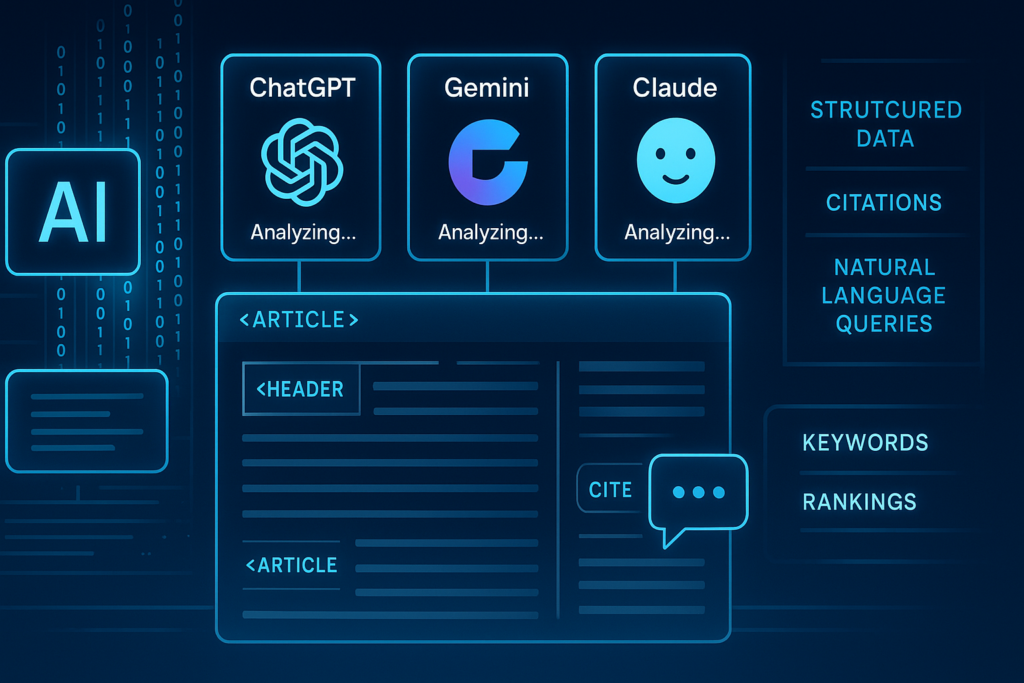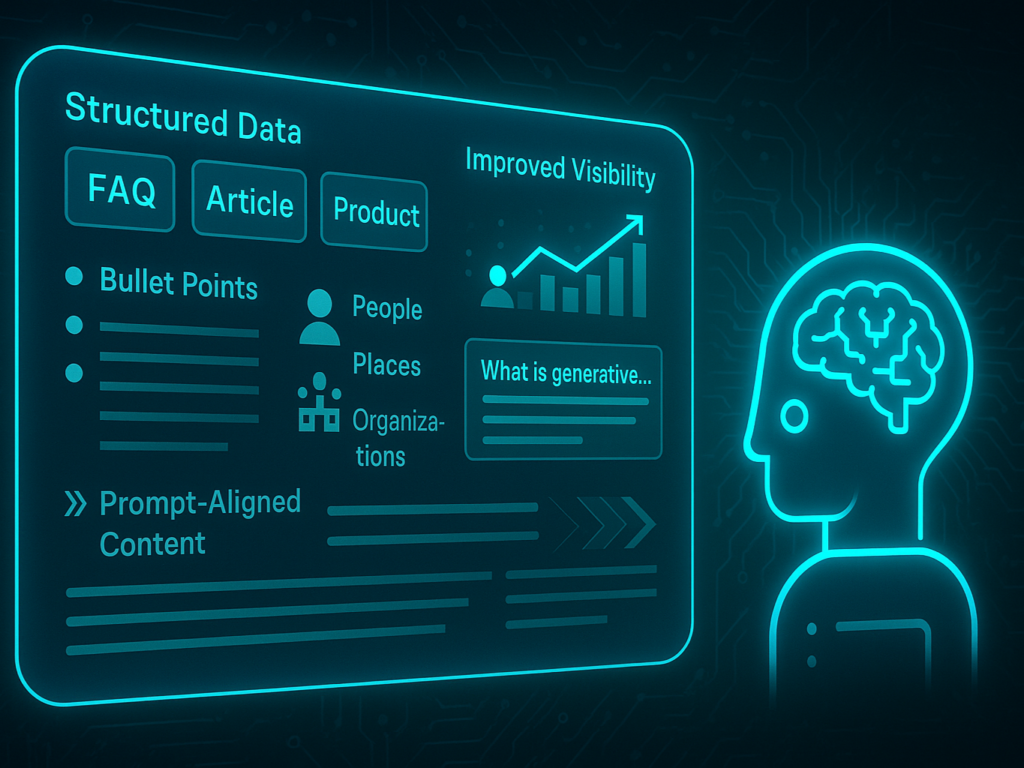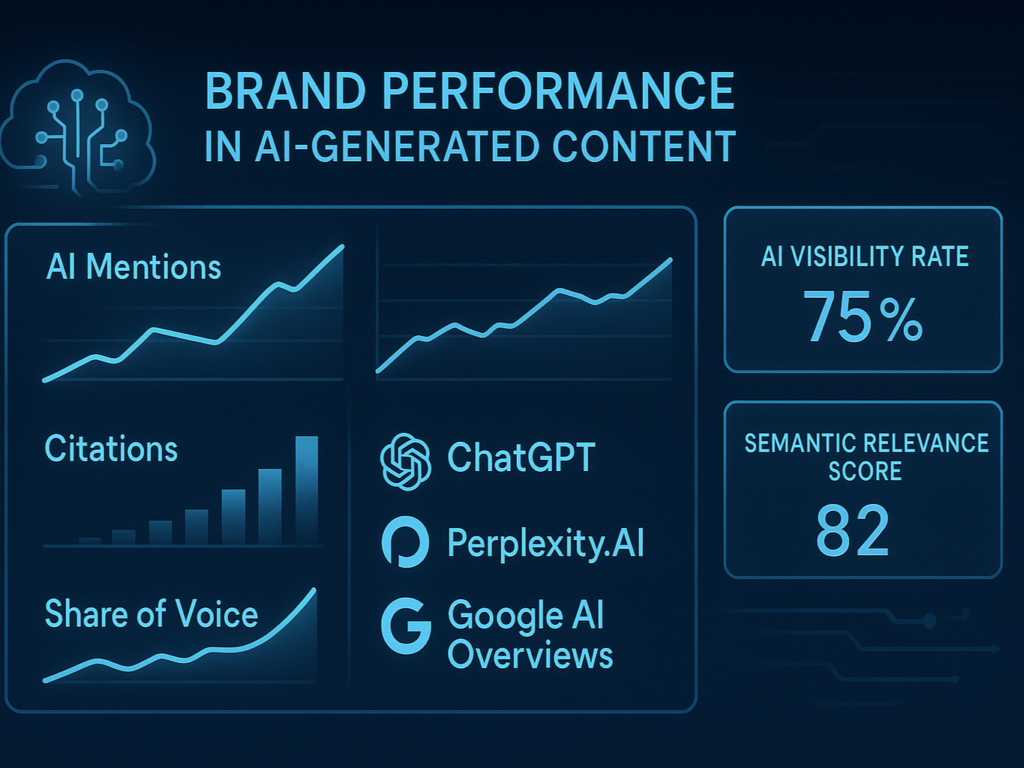Traditional search volume will likely drop by 25% by 2026 predicted to drop by 25% by 2026. This shift is unsurprising since nearly 79% of consumers will use AI-improved search next year.
The search landscape continues to revolutionize with platforms like ChatGPT reaching over 180.5 million monthly users. Perplexity AI has seen an incredible 858% jump in search volume. Your brand must adapt to these changes quickly. Generative SEO is different from traditional search optimization. It specifically helps your content get recommended by AI chatbots like Google Gemini and ChatGPT. Recent studies reveal that proper generative engine optimization can improve your content’s visibility in AI responses by 40%.
What I love about this evolution is that you don’t need to tackle it alone. Expert help is available online at reasonable rates. They can optimize your content to stand out in AI-driven search results. Let’s dive into generative SEO and discover how generative engine optimization services can keep your business visible as search evolves.
What is Generative Engine Optimization and Why It’s Different

Generative Engine Optimization (GEO) marks a transformation in online content discovery. GEO optimizes content for AI systems instead of traditional search engine algorithms, which sets it apart from earlier search approaches.
1. Definition of generative engine optimization
GEO helps structure, format, and enhance digital content specifically for AI-powered search and content generation systems. These systems include large language models (LLMs) like ChatGPT, Google Gemini, and Anthropic Claude. LLMs create text-based responses to what users ask.
GEO makes your content a go-to source for AI systems as they generate answers. This approach differs from regular SEO because AI models do more than match keywords. They understand context, assess information quality, and blend answers from multiple sources.
Your content needs several key elements to work with AI systems:
- Precise, structured data with proper semantic markup
- Entity-rich content that shows topic expertise
- Natural language that matches how people ask questions
- Complete topic coverage with authoritative information
GEO also helps your content become a cited source in AI-generated responses. AI assistants often reference authoritative sources when creating answers. Getting cited this way is the new form of “ranking” in the AI search world.
2. How GEO differs from traditional SEO
GEO and traditional SEO take different paths to success. Traditional SEO targets algorithm ranking factors for top search results. GEO wants your content featured right in AI-generated responses.
Different Goals: Ranking vs. Response Inclusion
GEO and traditional SEO take different paths to success. Traditional SEO targets algorithm ranking factors for top search results. GEO wants your content featured right in AI-generated responses.
(i) What Each Method Focuses On
These approaches have different targets. Traditional SEO looks at keywords, backlinks, and on-page factors to please search algorithms. GEO focuses on entity recognition, semantic relationships, and structured data that help AI systems grasp your content’s meaning.
(ii) Structure, Accuracy, and Formatting
Content structure sets them apart, too. Traditional SEO emphasizes keyword placement, meta descriptions, and header tags. GEO needs factual accuracy, complete information, and natural question-answer formats that match how people talk to AI assistants.
(iii) Tracking Success with Different Metrics
Success metrics tell different stories. Traditional SEO counts rankings, click-through rates, and organic traffic. GEO looks at citation frequency, presence in AI responses, and attribution percentage on AI platforms of all types.
(iv) Technical Tactics and Fast Changes
Traditional SEO has 20+ years of proven best practices. GEO is new territory that changes faster as AI models advance. Today’s strategies may need updates as these systems get smarter.
This specialized knowledge changes fast with AI technology. GEO experts can speed up your path to visibility in AI-generated responses. Their know-how lets you use state-of-the-art optimization techniques without learning everything yourself.
Why You Shouldn’t DIY Generative SEO
You’ll face many challenges if you try to optimize your content for generative engines without help. The complexity of staying visible grows as users move to AI-assisted platforms.
1. GEO is evolving faster than most marketers can keep up
AI-powered search optimization moves at lightning speed. Google, Microsoft, and OpenAI update their AI models weekly or monthly. What works today might not work tomorrow.
Traditional SEO took decades to develop. AI search technology changes much faster. AI search platforms have completely altered their ranking systems at least four times in the last year. These changes happen without any announcements or documentation.
Marketers who juggle multiple tasks find it hard to stay current. You need time to test, research, and experiment to maintain simple effectiveness. Most in-house teams can’t spare this much time.
2. Mistakes can reduce your AI visibility
Poor implementation of generative SEO doesn’t just limit opportunities, it can hurt your visibility in AI systems. AI models review content quality in ways that make some mistakes hard to fix.
Common DIY errors include:
- Improper schema implementation that confuses AI parsers
- Entity relationship errors that create wrong connections between concepts
- Content structure issues that make it hard for AI to extract information
- Outdated optimization techniques that new AI models see as manipulation
These problems often stay hidden until your brand vanishes from AI responses. Recovery takes three times longer than doing it right the first time.
Non-specialists struggle with these technical errors. A tiny formatting mistake in schema markup can break everything while looking fine to human eyes.
3. Experts stay updated on AI algorithm changes
GEO specialists dedicate their careers to understanding AI search systems. Through beta testing, expert forums, and ongoing research, they detect pattern shifts before they go public. These professionals know how AI rates sources and which strategies increase platform citation success.
Working with GEO experts gives your brand a competitive edge. Their industry-specific insights avoid costly mistakes and boost your visibility. As AI-assisted search grows, their role becomes essential, ensuring your content appears where users are now looking: in AI-generated answers.
Top Generative Engine Optimization Services You Can Hire Today
Expert help for AI visibility plays a significant role as search patterns evolve. Let’s get into one outstanding generative engine optimization service on Fiverr that can revolutionize your content’s performance in AI-driven search results.
| Service Title | What They Offer | Best For | Starting Price | Link |
| Do Website GEO or Generative Engine Optimization for AI and ChatGPT | Website GEO optimization, AI content targeting | Businesses, Marketers | $35 | View Service |
| Generative Engine Optimization with AI SEO Backlinks | AI SEO backlinks, GEO for content visibility | Startups, Bloggers | $295 | View Service |
| Do Generative Engine Optimization (GEO) | GEO strategies, AI-targeted content optimization | Content Creators, Agencies | $800 | View Service |
| TOP PICK: Do Generative Engine Optimization (GEO) | AI optimization, generating AI-friendly content | Entrepreneurs, Small Biz | $295 | View Service |
How to Choose the Right Generative SEO Expert
Choosing the right expert for generative engine optimization requires carefully evaluating skills and expertise. AI search evolves faster each day. Your brand’s visibility in AI-generated results depends on professionals’ understanding current practices and emerging trends.
1. Check for experience with AI search engines
The best generative SEO specialists have hands-on experience with AI search engines. These experts should know how platforms like ChatGPT, Perplexity AI, and Google’s AI Overviews process and interpret information.
Qualified professionals typically:
- Show familiarity with GPTbot crawling requirements
- Know how AI models choose what sources to cite
- Stay updated with AI algorithm changes across multiple platforms
- Have optimized for conversational queries
Research shows AI search engines respond strongly to content structure and presentation. Specialists must prove their success in adapting content for AI readability rather than just applying traditional SEO techniques.
2. Look for schema and entity optimization in the offer
Schema markup implementation plays a crucial role in effective generative SEO. This technical aspect helps AI engines understand your content’s context and structure. Service offerings should include:
- Schema.org markup implementation for your content type
- Entity-based optimization techniques
- Structured data implementation specific to your industry
- FAQ schema for conversational content
Schema markup gives clear signals about your content’s meaning. This increases the chances that large language models will reference your information correctly. Studies show structured data implementation can improve AI recognition by over 30%. This expertise becomes non-negotiable when selecting a provider.
Professionals combining technical schema implementation with content structure optimization achieve better results than those focusing on just one area.
3. Review past work and client feedback
Past results show a specialist’s true capabilities. Generative engine optimization remains a new field, so expecting years of experience might be unrealistic. Look for:
- Recent success stories with measurable improvements in AI visibility
- Work history with clients in similar industries
- Client testimonials mentioning AI search visibility improvements
- Proof of staying current with AI search trends
Case studies showing improved citation rates in AI responses reflect real expertise. The best providers clarify their optimization process and success metrics. Client feedback highlights those who adapt quickly to platform changes, demonstrating up-to-date knowledge.
Effective experts focus on both technical implementation and content strategy. They prioritize expertise, experience, and trustworthiness. Evaluating providers on these criteria helps ensure your content remains visible, allowing it to reach users across various AI-driven search interfaces.
What to Expect from Generative Engine Optimization Services

Professional GEO providers deliver specialized expertise to improve your content’s visibility in AI-powered search environments. You should know what deliverables to expect from generative engine optimization services. This knowledge will help you assess if you’re getting the right support.
1. Content restructuring for AI readability
GEO specialists make your content more available to AI systems. They organize information so that large language models can process and understand it better.
These providers use clear section headings to help AI systems navigate your content logically. The content flows naturally to match how people ask questions in conversation. They break down long paragraphs into shorter segments that AI systems can process quickly.
Making content match conversational search patterns plays a vital role in restructuring. Professional services shape your content to answer direct questions. This increases your chances of showing up in AI-generated responses. They might use question-answer formats that match common user queries perfectly.
Professional providers go beyond simple organization to improve content readability for AI:
- They break down complex concepts into clear, direct explanations
- They use bullet points and lists so that AI systems can extract information better
- They create summary points that AI can spot as key takeaways
2. Schema and structured data implementation
Good GEO services add technical markup that tells AI systems exactly what your content means. Schema markup has become essential for helping machines interpret web content.
These providers use JSON-LD (JavaScript Object Notation for Linked Data), which Google prefers for structured data. AI systems can better understand your content’s context and structure, while humans see your pages normally.
GEO specialists pick the right schema types for your content:
- FAQ schema for question-answer content
- Article schema for news or blog content
- LocalBusiness schema for location-based information
- Product schema for eCommerce pages
Providers make sure each schema type has all required and recommended properties. Incomplete implementation can reduce effectiveness. Websites with properly structured data have seen up to 35% increase in visits.
3. Entity-based optimization and prompt alignment
Advanced GEO services emphasize entity optimization, allowing AI systems to grasp the relationships between people, places, organizations, and concepts within your content. This method is more effective than traditional keyword-focused approaches for improving AI comprehension.
Providers identify key entities and connect them to established knowledge bases that AI recognizes. By incorporating specific names, dates, and sources, they ensure content is processed with clarity and precision, enhancing the accuracy of AI-generated responses.
These services also align content with common AI prompts, optimizing the structure based on user interaction patterns. This proactive approach boosts content visibility in AI-generated results, maintaining prominence as search behaviors evolve.
Common Mistakes to Avoid When Hiring GEO Services
GEO services can boost your AI visibility, but when hiring specialists, businesses often get it wrong. You can save time and money by knowing what mistakes to avoid when picking a GEO expert.
1. Choosing based on price alone
Picking the cheapest GEO service usually backfires. Companies that make decisions purely on cost end up working with providers who don’t understand AI systems or their crawling needs.
Quality GEO services put money into expert staff, use state-of-the-art tools, and stay current with AI algorithm updates. These investments make their services pricier but deliver better results. Expert providers test environments to track how different optimization methods work on AI platforms – something budget services can’t match.
Professional agencies might cost more initially, but their return on investment is nowhere near what novice providers offer. A few months with a cheap but ineffective service could cost more as AI search grows its market share.
2. Ignoring technical SEO compatibility
Technical website foundations directly shape your AI visibility. Website issues that slow down regular search engines create bigger problems for AI crawlers like GPTBot and ClaudeBot.
AI search engine crawlers struggle with:
- JavaScript-dependent content because they can’t run JavaScript even after downloading the files
- Pages that load slowly, which makes crawling less efficient
- Mobile display problems, which matter more as people use AI on their phones
- Missing SSL certificates that make AI systems trust your site less
A well-laid-out sitemap and clear URL structure help AI systems understand your content better. Without these technical foundations, even excellent content might stay hidden from generative engines.
3. Overlooking AI-specific formatting needs
AI systems process content differently from how humans do. Content that reads well for people might confuse AI systems.
AI-friendly formatting needs:
- Headers that match what users ask for
- Content rich in entities that shows how concepts connect
- Schema markup that tells AI what your content means
- Content blocks that AI can easily pull information from
Many GEO providers treat AI optimization like regular content writing. This misses how large language models work with information. The best services use semantic analysis and structured data methods explicitly built for AI understanding.
Dodge these common pitfalls and you’ll get more value from your GEO investment. Your content will also have a better chance of appearing in AI-generated responses.
How to Track Results from Your GEO Investment

GEO strategies need metrics different from traditional SEO to track return on investment. You need specialized monitoring approaches to measure how well your GEO strategies perform.
1. Monitor AI-generated citations and mentions
Your brand’s appearance in AI-generated responses is vital to generative SEO success. AI visibility differs from traditional search rankings and focuses on:
- Mentions: The frequency of your brand name in AI responses serves as the new equivalent of impressions, even without links.
- Citations: Links to your website within AI answers indicate higher authority to AI systems and drive traffic.
- Share of Voice (SOV): The percentage of relevant AI answers that feature your brand compared to competitors sets a standard for your market position.
2. Use tools to track AI traffic sources
AI platforms require specialized tools to measure incoming traffic effectively:
Google Analytics 4 needs custom channels specifically for AI traffic. Create a custom channel group that distinguishes visitors from ChatGPT, Perplexity, Claude, and other AI platforms. This setup helps you identify users who found you through AI-assisted searches rather than traditional engines.
Specialized platforms like Otterly track mentions on Google AI Overviews, ChatGPT, and Perplexity.AI automatically. These tools explain your brand’s appearance with historical insights and snapshots of AI responses.
3. Learn about brand visibility changes on AI platforms
These measurement practices will help you assess your GEO effectiveness:
- Regular testing schedule: Monitor your brand’s appearance in preferred AI engines monthly. AI platforms can summarize your online presence and analyze sentiment.
- Cross-platform verification: Different AI tools respond uniquely to prompts and pull from various data sources, so check your visibility across platforms.
- AI-specific KPIs: Performance assessment requires specialized metrics like AI-Generated Visibility Rate (AIGVR), Conversational Engagement Rate (CER), and Semantic Relevance Score (SRS).
AI search visibility changes constantly due to query intent, personalization settings, and model updates. Your measurement process should adapt accordingly.
Final Thoughts: Get Ahead of the AI Search Revolution
Generative Engine Optimization (GEO) is the future of digital visibility, as AI search platforms revolutionize how people discover information online. Unlike traditional SEO, generative engine optimization services require specialized expertise to adapt content for AI systems, ensuring your brand is visible in AI-generated responses.
AI algorithms evolve quickly, and integrating schema markup, entity relationships, and AI-friendly content structure enhances your chances of becoming an authoritative source for leading platforms. GEO professionals prevent costly mistakes and stay ahead of ever-changing AI algorithms, saving time and effort.
Early adoption of AI search optimization gives businesses a competitive advantage. You can see precise results with AI search metrics like mentions, citations, and share of voice. Invest in GEO services today to future-proof your brand and secure your spot in the evolving digital landscape. Explore Fiverr’s best Generative Engine Optimization services and future-proof your brand today. [Fiverr]



